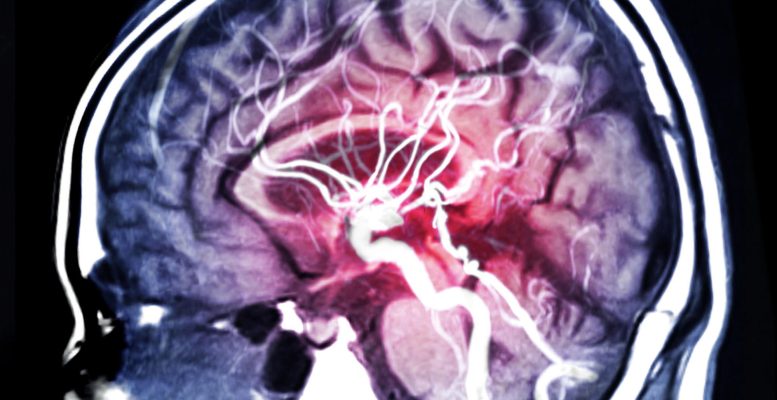
Accessible treatment combinations have been found to enhance results, proving especially beneficial for low- to middle-income countries where the majority of brain hemorrhage cases are observed.
The George Institute for Global Health has revealed data from the phase III INTERACT3 study. The study confirms that an innovative blend of treatments for stroke due to intracerebral hemorrhage (ICH) considerably elevates survival rates, minimizing major disabilities. The findings were presented at the European Stroke Organisation Conference held in Munich, Germany, and published in The Lancet.
The INTERACT3 trial is the first-ever randomized controlled study that has presented a distinctly positive outcome for ICH treatment. The implementation of this new treatment procedure, known as a Care Bundle, focusing primarily on swiftly controlling high blood pressure, resulted in superior recovery, decreased mortality rates, and an overall enhancement in the quality of life of the patients suffering from this grave condition.
Professor Craig Anderson, Director of Global Brain Health at The George Institute and a senior author of the research said, “Despite the high rates of ICH and its severity, there are few proven options for treating it, but early control of high blood pressure is the most promising. Time is critical when treating this type of stroke, so we tested a combination of interventions to rapidly stabilize the condition of these patients to improve their outcomes. We estimate that if this protocol was universally adopted, it could save tens of thousands of lives each year around the world.”
Commonly referred to as a hemorrhagic stroke or brain bleed, ICH is the second most common type of stroke and also the most deadly, with 40% to 50% of patients dying within 30 days. It occurs when blood leaks out of a blood vessel into the brain tissue and represents over a quarter of all cases of stroke, affecting approximately 3.4 million people a year.
In the INTERACT3 study, over 7,000 patients were enrolled across 144 hospitals in 10 countries – nine middle-income countries and one high-income country.
A Game-Changer for Stroke Treatment
The research team evaluated the effectiveness of the new Care Bundle, which included the early intensive lowering of systolic blood pressure, strict glucose control, fever treatment, and rapid reversal of abnormal anticoagulation.
They found that using this new treatment protocol compared to usual care reduced the likelihood of a poor functional outcome, including death, after six months. This was estimated to prevent one additional death for every 35 patients treated.
Central to this was a rapid reduction in systolic blood pressure, where target levels were achieved, on average, in 2.3 hours [range 0.8 to 8.0 hours], compared to 4.0 hours [range 1.9 to 16.0 hours] in the control group. The interventional protocol resulted in a statistically significant reduction in mortality, number of serious adverse events, and time spent in hospital, as well as demonstrating an improvement in health-related quality of life.
Addressing Stroke Burden in Low- and Middle-Income Countries
The burden of ICH is greatest in low- and middle-income countries. In 2019, 30% of all stroke cases in LMICs were ICH, almost double the proportion seen in high-income countries (16%). This is in part due to high rates of hypertension and limited resources for primary prevention strategies, including identification and management of stroke risk factors by healthcare services.
Dr. Lili Song, joint lead author and Head of the Stroke Program at The George Institute China, said, “A lack of proven treatments for ICH has led to a pessimistic view that not much can be done for these patients. However, with INTERACT3, we demonstrate on a large scale how readily available treatments can be used to improve outcomes in resource-limited settings. We hope this evidence will inform clinical practice guidelines across the globe and help save many lives.”
Reference: “The third Intensive Care Bundle with Blood Pressure Reduction in Acute Cerebral Haemorrhage Trial (INTERACT3): an international, stepped wedge cluster randomised controlled trial” by Prof Lu Ma, MD, Xin Hu, MD, Lili Song, PhD, Xiaoying Chen, PhD, Menglu Ouyang, PhD, Prof Laurent Billot, MRes, Qiang Li, MBiostat, Alejandra Malavera, MD, Xi Li, MM, Prof Paula Muñoz-Venturelli, PhD, Prof Asita de Silva, DPhil, Prof Nguyen Huy Thang, MD, Prof Kolawole W Wahab, MD, Prof Jeyaraj D Pandian, MD, Prof Mohammad Wasay, MD, Prof Octavio M Pontes-Neto, PhD, Prof Carlos Abanto, MD, Prof Antonio Arauz, PhD, Haiping Shi, MM, Guanghai Tang, MBBS, Sheng Zhu, MBBS, Xiaochun She, MM, Leibo Liu, MSEng, Yuki Sakamoto, MD, Shoujiang You, MD, Qiao Han, MD, Bernard Crutzen, MD, Emily Cheung, MD, Yunke Li, MD, Xia Wang, PhD, Chen Chen, MD, Feifeng Liu, MM, Yang Zhao, PhD, Hao Li, MD, Prof Yi Liu, MD, Prof Yan Jiang, PhD, Prof Lei Chen, PhD, Prof Bo Wu, MD, Prof Ming Liu, PhD, Prof Jianguo Xu, MD, Prof Chao You, MD and Prof Craig S Anderson, PhD, for the INTERACT3 Investigators, 25 May 2023, The Lancet.
DOI: 10.1016/S0140-6736(23)00806-1
The study was funded by the National Health and Medical Research Council, the Medical Research Council, the Wellcome Trust, and West China Hospital.
Never miss a breakthrough: Join the SciTechDaily newsletter.